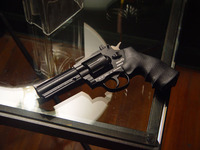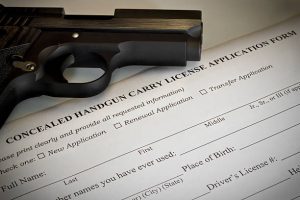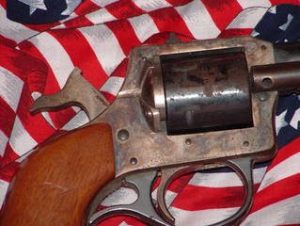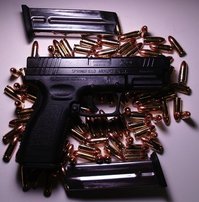 The gun violence in Chicago has been a great source of concern among the citizens and politicians in Illinois for a long time. Every day we are inundated with news of shootings and homicides throughout the City. When the weather heats up we know that the number of shootings will go up. On Monday morning we open the paper to find out how many people were shot and how many were killed over the weekend. In the effort to come up with a way to stop all the shootings, we need to understand how illegal guns are making their way to the streets of Chicago. Illinois has some of the most restrictive gun laws in the United States. To own a gun in your home, Illinois requires that you get a Firearm Owners Identification (FOID) Card which requires that a thorough background search be conducted by the Illinois State Police. FOID cards can be revoked for good cause by the Illinois State Police. Citizens are generally not allowed to carry a gun outside their home unless they have an FOID Card and are legally transporting it, or they obtain a Conceal and Carry Permit. To obtain a Conceal and Carry Permit you have to apply to the Illinois State Police, submit to a thorough background search and supply your fingerprints, and attend and complete gun training classes. Illinois was the last state to allow conceal and carry, and that was only after the Federal Courts ordered Illinois to do this.
The gun violence in Chicago has been a great source of concern among the citizens and politicians in Illinois for a long time. Every day we are inundated with news of shootings and homicides throughout the City. When the weather heats up we know that the number of shootings will go up. On Monday morning we open the paper to find out how many people were shot and how many were killed over the weekend. In the effort to come up with a way to stop all the shootings, we need to understand how illegal guns are making their way to the streets of Chicago. Illinois has some of the most restrictive gun laws in the United States. To own a gun in your home, Illinois requires that you get a Firearm Owners Identification (FOID) Card which requires that a thorough background search be conducted by the Illinois State Police. FOID cards can be revoked for good cause by the Illinois State Police. Citizens are generally not allowed to carry a gun outside their home unless they have an FOID Card and are legally transporting it, or they obtain a Conceal and Carry Permit. To obtain a Conceal and Carry Permit you have to apply to the Illinois State Police, submit to a thorough background search and supply your fingerprints, and attend and complete gun training classes. Illinois was the last state to allow conceal and carry, and that was only after the Federal Courts ordered Illinois to do this.
In spite of some of the nation’s strictest gun laws, Chicago has established a reputation as America’s deadliest city. Chicago Police report that in 2015, over 2,900 people were shot and 470 people were murdered. In 2016, there were 762 homicides, 3,550 shooting incidents and 4,331 shooting victims. 2016 was the deadliest year in Chicago in 20 years. Chicago recently saw it’s 500th murder of 2017. These statistics, coupled with the strict Illinois gun laws, have become an example cited by gun rights activists to argue that gun control legislation doesn’t work. But a closer look at some of the evidence concerning where these guns are coming from tells us a different story.
According to the FBI, roughly 60% of guns used in crimes in Illinois were from out of state. The overwhelming number of those guns flow into Illinois from states that have much less restrictive gun laws. Most of those out of state guns came from Indiana, which is next to Illinois. Second place goes to Mississippi and third place goes to Wisconsin. The FBI data suggests that there’s lots of trafficking of guns within Illinois but point out that it’s very difficult to trace those guns once they get into the state because Illinois does not require registration of guns, does not license or regulate gun dealers, doesn’t limit how many guns can be sold at one time and does not require background searches on gun sales that are not conducted at a gun show. Indiana has really lax gun laws. Gun dealers are required to perform a very basic background search while a vendor can sell their “private collection” to anyone at a gun show without any background search whatsoever. So someone can buy an assault rifle at a Crown Point Indiana gun show without any background search, and drive an hour into Chicago, where assault rifles are banned. A 2015 study by the University of Chicago suggested that only 11% of guns involved in crimes in Chicago were purchased through federally licensed gun dealers, which require background searches. In 2014 the Chicago Police reported that roughly 60% of guns used and recovered from crime scenes between 2009 and 2013 were purchased outside of Illinois. Exact figures are hard to pin down but it is clear that the vast majority of guns making their way to the streets of Chicago are coming from outside of Illinois.
 Transporting a firearm in Illinois can be a complex process, as the state has specific laws and regulations designed to balance public safety and the rights of gun owners. Understanding these requirements is essential to avoid criminal charges and ensure compliance with Illinois firearm transportation laws. As criminal defense attorneys, we often see individuals facing legal consequences for failing to properly transport their firearms, often due to confusion about the law. This article aims to provide a comprehensive guide on how to legally transport a firearm in Illinois while avoiding common pitfalls.
Transporting a firearm in Illinois can be a complex process, as the state has specific laws and regulations designed to balance public safety and the rights of gun owners. Understanding these requirements is essential to avoid criminal charges and ensure compliance with Illinois firearm transportation laws. As criminal defense attorneys, we often see individuals facing legal consequences for failing to properly transport their firearms, often due to confusion about the law. This article aims to provide a comprehensive guide on how to legally transport a firearm in Illinois while avoiding common pitfalls. Chicago Criminal Lawyer Blog
Chicago Criminal Lawyer Blog


 Today, I met with 2 new clients to talk about representing them for their criminal cases at the Rolling Meadows Courthouse. Both cases have different facts, and both clients responded differently when they were confronted by the police. I want to talk about these 2 cases because they illustrate how what clients do when they interact with the police, can often be the difference between winning and losing a criminal case, going to jail, or walking away from criminal charges without a conviction.
Today, I met with 2 new clients to talk about representing them for their criminal cases at the Rolling Meadows Courthouse. Both cases have different facts, and both clients responded differently when they were confronted by the police. I want to talk about these 2 cases because they illustrate how what clients do when they interact with the police, can often be the difference between winning and losing a criminal case, going to jail, or walking away from criminal charges without a conviction. Earlier this week, I met with a client who was pulled over by the State Police for driving 38 miles an hour over the speed limit on the Tollway. The client did not realize that driving 38 miles an hour over the posted speed limit in Illinois is a crime. He did not realize that he could be charged with a Class A Misdemeanor for driving at such an excessive speed. He did not know that he was facing the possibility of being sentenced to one-year in County Jail and fined up to $2,500.
Earlier this week, I met with a client who was pulled over by the State Police for driving 38 miles an hour over the speed limit on the Tollway. The client did not realize that driving 38 miles an hour over the posted speed limit in Illinois is a crime. He did not realize that he could be charged with a Class A Misdemeanor for driving at such an excessive speed. He did not know that he was facing the possibility of being sentenced to one-year in County Jail and fined up to $2,500. Every New Year brings us new laws and new regulations that impact the criminal law and the way we live. On January 1, 2019, several changes to the Illinois gun laws went into effect which make it a little more difficult for people to buy a gun and makes it easier for law enforcement personnel to take guns away from people that may be deemed dangerous. The final change is an attempt to stem the rising tide of mass shootings. The changes to the Illinois gun laws are set forth below.
Every New Year brings us new laws and new regulations that impact the criminal law and the way we live. On January 1, 2019, several changes to the Illinois gun laws went into effect which make it a little more difficult for people to buy a gun and makes it easier for law enforcement personnel to take guns away from people that may be deemed dangerous. The final change is an attempt to stem the rising tide of mass shootings. The changes to the Illinois gun laws are set forth below. In response to the dramatic rise in the number of mass shootings around the country, earlier this year the Illinois Legislature began working on legislation aimed at trying to stop mass shootings from happening in Illinois. As a result, on July 16h, 2018, Illinois governor Bruce Rauner signed into law the Firearms Restraining Order Act which allows for petitions to be filed in court to have a no contact order issued against someone deemed to be a threat to themselves or to others. The new law is commonly called the “Red Flag” bill. It would allow family members, police and others to seek an Order Protection in Court to take away the guns from someone found to pose “an immediate and present danger” to themselves or to others.
In response to the dramatic rise in the number of mass shootings around the country, earlier this year the Illinois Legislature began working on legislation aimed at trying to stop mass shootings from happening in Illinois. As a result, on July 16h, 2018, Illinois governor Bruce Rauner signed into law the Firearms Restraining Order Act which allows for petitions to be filed in court to have a no contact order issued against someone deemed to be a threat to themselves or to others. The new law is commonly called the “Red Flag” bill. It would allow family members, police and others to seek an Order Protection in Court to take away the guns from someone found to pose “an immediate and present danger” to themselves or to others. The gun violence in Chicago has been a great source of concern among the citizens and politicians in Illinois for a long time. Every day we are inundated with news of shootings and homicides throughout the City. When the weather heats up we know that the number of shootings will go up. On Monday morning we open the paper to find out how many people were shot and how many were killed over the weekend. In the effort to come up with a way to stop all the shootings, we need to understand how illegal guns are making their way to the streets of Chicago. Illinois has some of the most restrictive gun laws in the United States. To own a gun in your home, Illinois requires that you get a Firearm Owners Identification (FOID) Card which requires that a thorough background search be conducted by the Illinois State Police. FOID cards can be revoked for good cause by the Illinois State Police. Citizens are generally not allowed to carry a gun outside their home unless they have an FOID Card and are legally transporting it, or they obtain a Conceal and Carry Permit. To obtain a Conceal and Carry Permit you have to apply to the Illinois State Police, submit to a thorough background search and supply your fingerprints, and attend and complete gun training classes. Illinois was the last state to allow conceal and carry, and that was only after the Federal Courts ordered Illinois to do this.
The gun violence in Chicago has been a great source of concern among the citizens and politicians in Illinois for a long time. Every day we are inundated with news of shootings and homicides throughout the City. When the weather heats up we know that the number of shootings will go up. On Monday morning we open the paper to find out how many people were shot and how many were killed over the weekend. In the effort to come up with a way to stop all the shootings, we need to understand how illegal guns are making their way to the streets of Chicago. Illinois has some of the most restrictive gun laws in the United States. To own a gun in your home, Illinois requires that you get a Firearm Owners Identification (FOID) Card which requires that a thorough background search be conducted by the Illinois State Police. FOID cards can be revoked for good cause by the Illinois State Police. Citizens are generally not allowed to carry a gun outside their home unless they have an FOID Card and are legally transporting it, or they obtain a Conceal and Carry Permit. To obtain a Conceal and Carry Permit you have to apply to the Illinois State Police, submit to a thorough background search and supply your fingerprints, and attend and complete gun training classes. Illinois was the last state to allow conceal and carry, and that was only after the Federal Courts ordered Illinois to do this. Yesterday, Illinois governor Bruce Rauner, signed a bill into law which increases the minimum sentence for defendants convicted of a second or subsequent violation of
Yesterday, Illinois governor Bruce Rauner, signed a bill into law which increases the minimum sentence for defendants convicted of a second or subsequent violation of 
 This question cannot be answered with a simple yes or no answer. Unfortunately, the Illinois Unlawful Use of a Weapon (UUW) statute is a little complicated and requires an explanation. Another question I frequently get asked is: How do I legally transport a handgun in Illinois? Here it goes.
This question cannot be answered with a simple yes or no answer. Unfortunately, the Illinois Unlawful Use of a Weapon (UUW) statute is a little complicated and requires an explanation. Another question I frequently get asked is: How do I legally transport a handgun in Illinois? Here it goes.